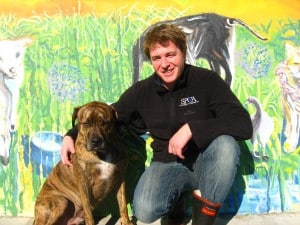After qualifying and working as a landscaper for five years, SPCA inspector Simon Kale decided he would rather work with animals than plants and trees.
“I was looking for a change and saw this course,” he says of the National Certificate in Animal Care. Shortly after starting at EIT, he was offered a part-time position at the SPCA Hastings and Districts’ centre in Heathcote Road. “That worked in perfectly with the study.”
Growing up with dogs and cats on the family’s orchard in Clive, Simon has always been interested in animals. So he enjoyed the study, not least because of the opportunities it provided for learning beyond the classroom.
“I learn most when I’m out there doing it,” he says of work experience placements he had at a farmyard zoo and boarding kennels and cattery. “It’s always good to have that experience, it backs up what you’re learning in the classroom.”
The six months of study was full-on and intense, but Simon believes students get out of it what they put in.
“If you try as hard as you can on the practical side and if you study hard you will get the results.”
His tip is to make use of EIT’s helpful tutors.
“They were there if anyone was struggling with anything. And the classes weren’t huge – just over 20 students in my case. That allowed me to get more out of my learning. I got to know everyone in the class so it wasn’t intimidating to ask questions or to do a presentation.”
Later, Simon found his certificate learning useful when the SPCA put him through an inspector’s course to equip him for handling complaints about animal abuse or mistreatment.
“The animal care course was pretty handy as that was one of the aspects of the study. Mostly it covered the Animal Welfare Act, so the emphasis was on law. But it was definitely handy to have that knowledge.”
While he prosecutes cases of animal mistreatment, the main focus of Simon’s job is education.
“Not all cases of animal ill-treatment are deliberate,” he explains. “Most are because people don’t understand how to look after animals.”
On a tour of the animal enclosures at his workplace, Simon is shadowed by Zinny, a hefty mastiff cross he took home from the pound several years ago.
“He’s on a bit of a diet at the moment because he’s always looking for treats when he’s here.”
The centre, which mainly houses dogs, cats, guinea pigs and rabbits but sometimes goats and once a pig, relies on volunteers to help with its operation.
“We have three staff members on duty during the week and two at weekends and there’s too much work for all of us. The volunteers walk the dogs and play with the animals, socialising them.
“We also get animal care students coming in, usually two every semester, and they help us on Thursdays and Fridays. They keep a work diary and are assessed for their EIT programme.”
One of the attractions of working at the centre is the puppies and kittens and Simon agrees they are fun. But what he really enjoys most is getting out among the community, “working with animals that are suffering.”


